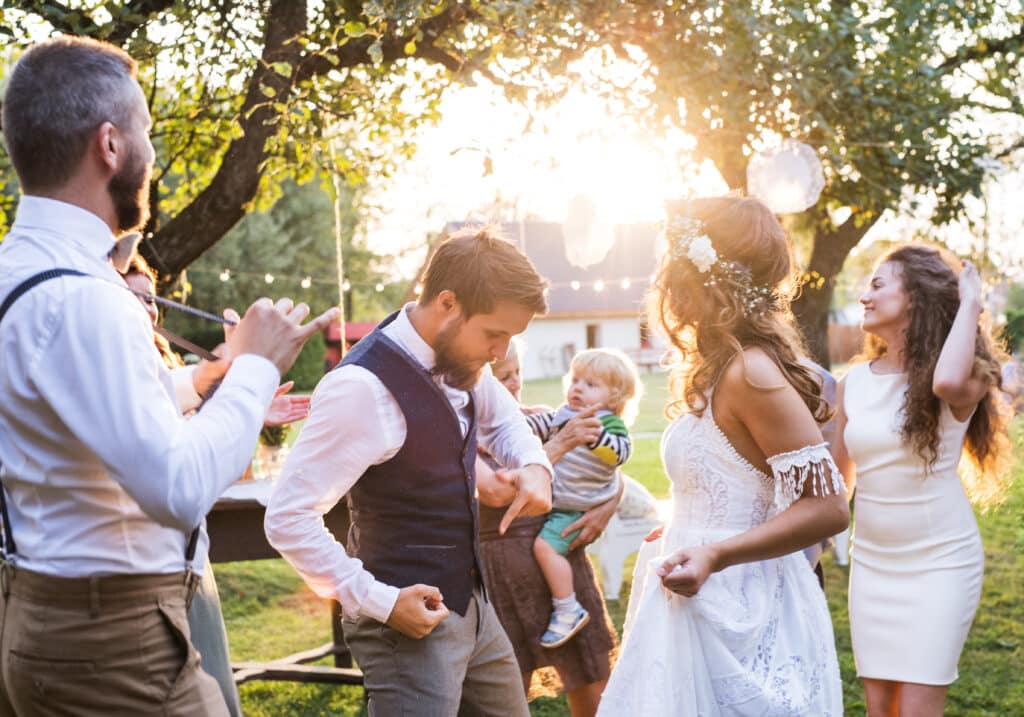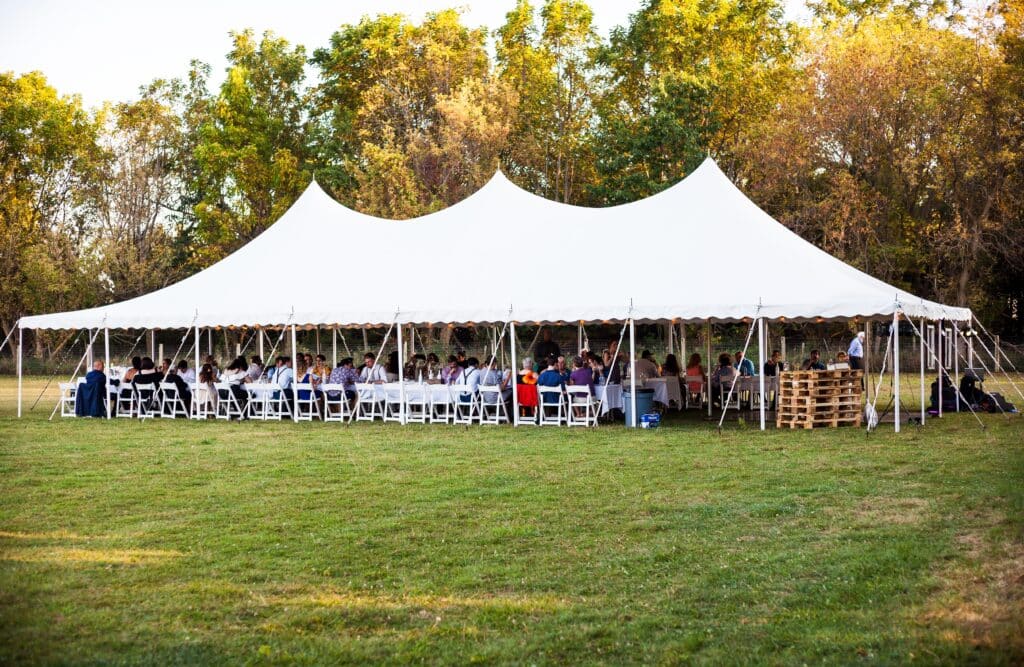Planning a successful event goes beyond decorations, entertainment, food and beverages. A good event coordinator will always plan for the unexpected. It’s important to protect the guests, venue and vendors in the case things don’t go quite right (which we all know never do). Things like inclement weather, unexpected cancellation, guest accidents or damage to the event location are all cases where event insurance is there to protect you from the financial cost. Read on to get answers to your biggest questions about event insurance.
What Types of Gatherings Are Covered Under Event Insurance?

Some event insurance policies will only cover certain types of events, while others will provide more comprehensive coverage. It’s important to read the policy carefully to understand what is and is not covered.
Events typically covered by event insurance include weddings, corporate events, golf tournaments, private parties, concerts, festivals, fundraisers, holiday parties, employee retreats, class reunions, and more. On the other hand, events that are considered more hazardous are sometimes unable to be covered or can only be covered at a higher price. These more precarious events include things like organized protests, rallies or marches, gun shows, and motorized events such as tractor pulls.
For any of these types of events, a reputable insurance agency can help you in your search for the right coverage with the right company. If you are holding a more “unpredictable” event, it is highly recommended that you seek some guidance. An agency can do the leg work for you to find the right fit for your needs.
What Risks Are Covered Under An Event Insurance Policy?

Event insurance can cover a variety of risks. When choosing an event insurance policy, be sure to ask about coverage for loss of deposits, additional expenses incurred, and business interruption. Do understand that event insurance standards have changed since the pandemic.
For example, most event insurance policies used to cover lost revenue due to cancellation or postponement. For example, if the event had to be canceled due to weather, insurance may have covered lost hotel or venue fees, or even refunded event tickets. However, COVID-19 has changed the game. The pandemic caused so many event cancellations that many companies are reluctant to offer cancellation or postponement coverage in the same way that they used to.
When choosing an event insurance policy, don’t make any assumptions about the amount of coverage that will be included. Be sure to ask about the policies limitations on things like loss of deposits, cancellation (for a variety of reasons) and incurred expenses.
What Type of Event Insurance Do You Need?

Event insurance typically provides general liability coverage. The amount of coverage needed depends on a variety of factors, but most venues will require at least 1 million dollars in coverage. However, things like cancellation insurance, liquor liability coverage, and third-party damage insurance are all coverages you may need to consider depending on what your type of event is and what is involved. Here are some of the coverage types to consider for your event insurance policy:
- Event Cancellation Coverage – Event cancellation will reimburse you for certain expenses if you need to cancel your event. This coverage can help to protect you from lost revenue, non-refundable deposits, and other costs associated with canceling an event. In order to qualify for event cancellation coverage, you typically need to purchase the policy at least 30 days before your event is scheduled to take place. You will also need to provide proof that the event was canceled due to an eligible reason, such as severe weather, illness, or a death in the family. If you’re planning on hosting an event, be sure to check whether event cancellation coverage is included in your event insurance policy. While this type of coverage is not required by law, it is highly recommended for any event that has a significant financial investment at stake.
- Liquor Liability Coverage – Alcohol consumption can increase the risk of accidents and injuries, and if something goes wrong, event organizers can be held responsible. Liquor liability coverage can help protect event organizers from costly lawsuits and damages.
- Food Liability Coverage – Many event insurance policies include food liability coverage, which can help to protect you from financial losses if someone becomes sick after eating food at your event. This coverage can help to cover the cost of medical bills, legal fees, and lost income if you are sued.
- Third-Party Damage Coverage – This type of insurance will cover any damages that are made to the event venue. This can include things like the physical building itself, but also the rented equipment such as chairs, tables, tents, stages, sound equipment, etc.
What if I’m Getting Married?

If you’re planning a wedding, there are a few additional types of insurance that you may want to consider on top of the event insurance. These include travelers insurance, homeowners insurance, car insurance, and personal articles floaters insurance.
- Travelers insurance is a good option if you’re planning a destination wedding. This type of insurance can provide coverage for lost luggage, canceled flights, and other travel-related problems.
- Homeowners insurance is important to consider for at home weddings as it can provide coverage for damage to your home or belongings, as well as liability coverage in case someone is injured on your property.
- Car Insurance – If you are renting a vehicle that you plan to personally drive, then in most cases, your personal auto policy would extend to cover you while you drive the rented vehicle. There are some exceptions to this, but it’s usually true. Be sure to check that your car insurance covers you in the event of an accident.
- Personal Articles Floaters Insurance – You may also want to consider a personal articles floater insurance policy to cover any valuables you’re bringing with you such as jewelry or gifts.
- Pet Insurance – Who doesn’t love a four-legged ring bearer? If you’re bringing your pets with you to the wedding, or leaving them to be cared for by others while you are away, be sure to get them insured with a pet insurance policy.
How Much Does Event Insurance Cost?

The cost of event insurance varies depending on a number of factors, such as the type of event, the location, the number of guests, and the length of the event. For example, a wedding in a large city with 200 guests is going to cost more to insure than a small private party with 50 guests at your family farm.
Many event insurance policies have a minimum premium, which is the amount you’ll need to pay to purchase the policy. On average, you can expect to pay around $500 for a standard event insurance policy.
When Do I Need to Purchase Event Insurance?
It’s generally recommended that you purchase event insurance at least 21 days prior to your event. This will ensure that you’re covered in case of any unforeseen circumstances that may occur leading up to the event.
How Can I Get Event Insurance?

No one likes to think about the possibility of something going wrong at their event, but the fact is—accidents can happen. It’s important to have the right event insurance coverage in place and to understand what it covers.
Event insurance can help to cover the cost of damages or injuries that occur during an event. It can also provide protection in the event of cancellation or postponement. Event insurance policies are typically very affordable, and the peace of mind they provide can be well worth the cost.
There are a variety of event insurance policies available, so it’s important to work with an experienced agent that can help you determine which coverage is right for your event. With the right event insurance in place, you can rest assured knowing that you’re prepared for the unexpected.
At Torian Insurance we have an experienced team of professionals that are ready to help you get your event covered efficiently and effectively with the proper event insurance coverage. Contact us today to discuss the details of your gathering so that we can get you covered.



